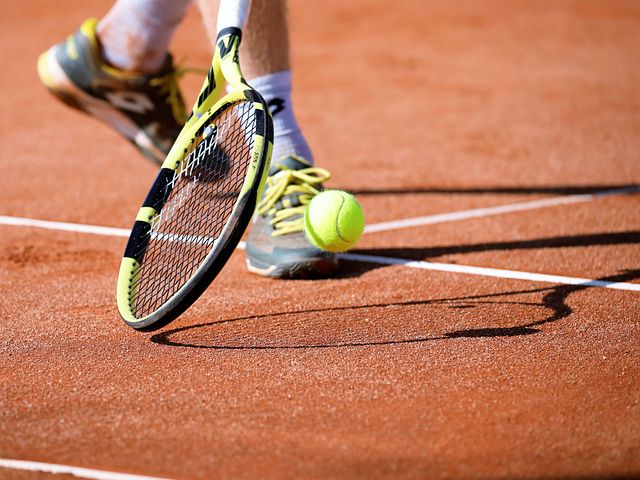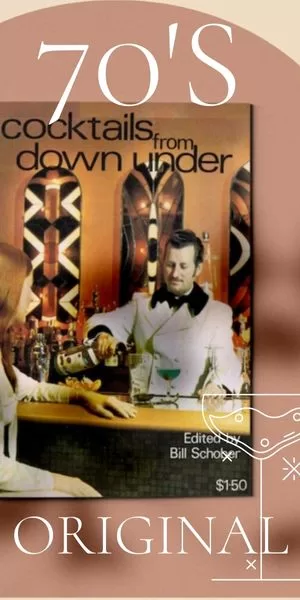Paul McNamee back in his day, was undoubtedly just as much tennis eye candy as he was a legendary player .
Born and raised in Melbourne, 12 November, 1954, McNamee started playing tennis in 1961 at the tender age of seven years old. Then, after showing so much promise as a junior, this talented teenager went on to win his first title, The Boys’ Singles Tournament in 1973.
He would later triumph at the Australian Open and go on to become a top International player, conquering both Wimbledon and the Australian Open, alongside doubles partner Peter McNamara. Hunched over and curly-haired beside the rangy Peter McNamara, they were the Supermacs, fondly remembered to this very day. Along the way, he has also shared the court with many bigwigs such as Rod Laver, Martina Navratilova, John McEnroe and Bjorn Borg.
It comes as no surprise that Sport was in his DNA. One uncle, Dick Reynolds, won three Brownlow medals. Another, Jack McNamee, held the Australian welterweight boxing title. He had a handshake so fierce you had to brace yourself when you met him.
McNamee won two singles and twenty-three doubles titles during his professional career.
McNamee was also a member of the Australian Davis Cup Team, which won the Davis Cup in 1983 and 1986.
It was whilst playing Davis Cup semi’s in 1985, that McNamee underwent surgery for a serious kidney problem. He asked the medics if he could manage the pain and continue playing. The condition was congenital and they advised McNamee to retire his game. He asked what would happen if he didn’t? He was told, at any time his kidney may just give up. Still wanting to play, he asks how will he know when its going to give up? The doctors advised him that he would be in so much pain, it would be the equivalent to a woman’s pain during child birth. Even with this warning, McNamee decided to press on.
Before he did anything else, he informed the captain Neale Fraser of the situation so it would not be a complete surprise if something went wrong. He played the US Open first, beating Guillermo Vilas in five sets before bowing out to America’s Tim Wilkinson.
Then a week in Barcelona to train prior to heading to Malmo.
Then it struck. His last night in Barcelona was torture. He had never experienced a pain like it. Not wanting surgery in Spain, his only thought turned to getting to London as quickly as possible. Fraser helped McNamee pack and drove him to the airport. His Davis Cup dream for that year was over. The boys would have to finish without him.
Once McNamee arrived at Heathrow, he decided to head all the way home to Melbourne where he had family and friends to aid in his recovery. Still in pain, he bluffed his way onto a flight with the aid of pain killers, that didn’t always work. In Melbourne, a splint was placed in his urinary tract. He ended up with a 12 centimetre scar, but he got his kidney function back which was a huge relief. Back in Malmo, the boys battled hard, but went down without winning a set.
After the Davis Cup Win in late 1986, McNamee knew that at 32 years of age, it was time for him to make the transition to the next stage of his tennis life. He told Fraser to leave him out of the Davis Cup equation, 1987 would be his last year on tour.
Unusual for a player of his generation, McNamee preferred to play on a clay surface.
McNamee: ”For me, it is so far above any other surface,” he says. ”It’s the poetry, the art, the essence of the sport. It’s the angles, the nuances. I feel joy when I walk onto a clay court.”
McNamee is also the only player to have changed from a one-handed to a two-handed backhand midcareer.
McNamee came closest to reaching a major final at the 1982 Australian Open when a let cord went against him at match point in a semi-final. He often ponders over where his career may have gone, had he have won that match.
McNamee: ”In sport, the knocks are as important as the wins, possibly more so, in formulating who you are. I’ve never been one for regrets.”
If you ask McNamee what his greatest tennis achievement was during his 15 year career, he would undoubtedly say his win over John McEnroe. in the third round in the French Open at Roland Garros in 1980 when the volatile New Yorker was No.2 in the world and heir apparent to Bjorn Borg. From the time McEnroe called McNamee a ‘Jerk’ he learnt how to push his buttons and rattle him.
McNamee kept McEnroe guessing for four hours by hitting high bouncing balls off the red clay to the backhand and closed out the match with a series of top-spin lobs over McEnroe’s curly fire-red hair. Even today, McNamee finds it hard to describe the euphoria of that moment, and the crowd of 14,000 were right there behind his every hit. In those days, McEnroe wasn’t as popular and was considered somewhat of an American tosser.
McEnroe would later confess to McNamee that it would take him two days to recover from that match, and that was the defining moment in their mutually respected friendship.
Paris was McNamee’s graduation as a player, and clay he saw as a rite of passage from amateur to professional.
McNamee and McEnroe continued their rivalry for years. On another centre court, this time at Wimbledon in 1982, the Aussie had the last word, the final pulsating point of his doubles victory with Peter McNamara over McEnroe and Peter Fleming being recently voted the most exciting point in the 136-year history of The Championships.
When McEnroe reflects back to that time he recalls how very similar the two players were. Both were intense, had loads of nervous energy, were annoying and brilliant, extremely competitive and above all, had an undeniable love for the game.
Another defining moment was as a young man, McNamee played against 47-year-old Frank Sedgman. McNamee considers this encounter to be among some of the greatest events in his life, even surpassing the 2007 Cox Plate win of his horse El Segundo.
After his retirement, McNamee became a major administrator in Australian sport and a driving force behind much of the tennis we continue to enjoy today.
It was McNamee who pushed for Flinders Park to be re-named Rod Laver Arena and building the International profile of the Australian Open.
The Australian Open has become a major highlight on Australia’s ever-crowded sports calendar, attracting huge crowds to Melbourne Park and making headlines around the globe as the world’s best players do battle for the year’s first grand slam tournament.
As tournament director, then chief executive for a decade until 2006, he made several crucial decisions that gave the Open the $240 million economic impact it has today.McNamee is credited with giving the Open new energy, and moving the men’s final to a prime-time slot, which gave the 2005 final the highest television ratings ever.
Besides cultivating it into Australia’s biggest sporting event, perhaps what he is most proud of is it’s position as Grand Slam of the Asia-Pacific.
He was also the co-founder of the Hopman Cup, alongside Brisbane’s Charlie Fancutt.
The Hopman Cup doesn’t only honour a great Australian, but also a great attitude to the sport.
McNamee: “Mr Hopman always took an interest in my matches. “I wasn’t a great player but the fact he was taking such an interest really motivated me. The Hopman Cup was not just a way to say thank you to him on behalf of all Australian’s but it was a tournament that reflected the sheer joy of tennis.”
McNamee: “There’s so much doom and gloom and scandal around sport these days but the Hopman Cup harks back to the days when tennis wasn’t about computer ranking points or big prize money. It’s a tournament where some of the best players in the world take part because it’s such great fun.”
McNamee served as Tournament Director of the Hopman Cup and CEO of the Australian Open until 2006. The astute sports administrator spent 12 years at Tennis Australia, where he transformed the Australian Open from a Melbourne Park event into the grand slam of the Asia-Pacific.
For two years 2006 – 2008, McNamee walked away from the tennis arena to concentrate on being Tournament Director for Golf Australia, of the Australian Golf Open. It was a job he truly loved, the only problem was it was part time.
It wasn’t long and in March 2008, the Melbourne Football Club dangled a carrot in front of him, he couldn’t say no too. Within weeks, the board that recruited him, were gone. They weren’t on the same page. He knew his days were numbered. He lasted three months, meanwhile Frank Lowy had other plans for the former tennis champ. Lowy tried to headhunt him for the top job at Football Federation Australia (FFA), to effectively head up the World Cup Bid. But McNamee didn’t think that Australia was passionate enough about the sport, not like they are in Europe and Sth America. Besides, soccer was a sport he loved to share with son Rowan, who was Captain at Wesley Grammar School, and he did not want to spoil that by bringing his work home.
In late 2008, NcNamee joined the push for Australia to field a cycling team at the “Tour De France” with the full support of Cadel Evans.
McNamee coached Taiwan’s Hsieh Su-wei to a women’s doubles title in London, teaming with with Peng Shuai to beat Australia’s Ash Barty and Casey Dellacqua.
McNamee has spent the past three years as an ATP tournament director in Turkey and Bulgaria he also found time to complete his Bachelor of Science with majors in Statistics and Law at Monash University.
2018, and now Basketball Australia has enlisted the former Australian Open Chief Executive to spearhead its growth into Asia, ahead of the 2019 China World Cup and 2020 Tokyo Olympics. With men’s and women’s national teams considered major medal chances, the sport’s governing body has moved to cash in on the Ben Simmons-led basketball boom.
Now 63, McNamee’s experience should open unprecedented doors for Basketball Australia to commercialize the national team. The goal is for basketball to take its place at the top table of Australian sport.
In 1986, NcNamee was made Member of the Order of Australia (AM)
1987 and McNamee was awarded with the Warren Kennedy Memorial Award for Sportsmanship and he was also officially crowned “Melbournes King of Moomba” a fun festival on Labour Day weekend.
Unfortunately around that same time, a bomb went off in the South Yarra apartment block he was living in, regrettably with a fatality. McNamee was in the building at the time, so that shook him up for days. Even though the building block was ablaze, McNamees thoughts diverted to his Mercedes 500 SEC coupe. It’s a model not sold in Australia, and he managed to rescue it before the fire took over the garage. Later he thought, he shouldn’t have been focusing on something material that could have easily been replaced, but you know how it is with boys and their toys.
In 1996, Monash University presented McNamee with a Distinguished Alumni Award.
McNamee has also penned his own book entitled “Game Changer”. It took him four years to complete.
And if thats not an impressive sporting resume, Macca’s also appears in a Diet Coke advertisement. Funny I always thought his preferred drink was Chiras.



